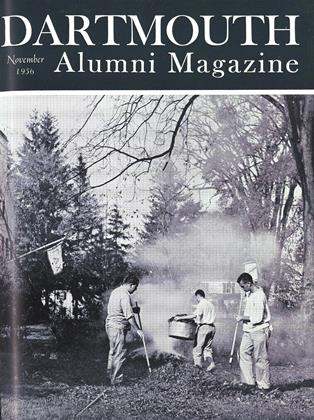The election of Richard Eberhart '26 as Professor of English brought to the Dartmouth campus this fall one of America's leading poets. He is teaching a poetry seminar for seniors and also an advanced writing course.
During the past four years, a succession of appointments as Poet in Residence and Visiting Professor took Eberhart to the University of Washington, The University of Connecticut, Wheaton College, and Princeton University. As a creative poet he fills the role of teacher in a unique way, and it was this rare combination that led the ALUMNI MAGAZINE to invite him to write about "The Poet as Teacher."
The Eberhart biography to date is just as intriguing: a freighter trip around the world after Dartmouth; a B.A. from Cambridge University, England, in 1929; a year as tutor to the son of King Prajadhipok of Siam; an M.A. from Cambridge in 1932 and then a year of graduate study at Harvard; Master in English at St. Mark's School from 1933 to 1941; College Board reader during that same period; English teacher at the Cambridge School; four years in the Navy from 1942 to 1946, with the discharge rank of Lieutenant Commander; then Assistant Manager, later a Vice President, of the Butcher Polish Company of Boston, the first makers of floor wax in America; and, all the while, the writing of poetry that won the highest critical acclaim in this country and in England.
The first volume of Eberhart poems, A Bravery of Earth, appeared in 1930. It was followed by Reading the Spirit(1937), Song and Idea (1940), PoemsNew and Selected (i944), Burr Oaks (1947), Brotherhood of Men (1949), An Herb Basket (1951), Selected Poems (1951), and Undercliff (1953). A poetic drama, The Visionary Farms, was produced in Cambridge in 1952, and in 1953 at the University of Washington.
The 1951 volume of selected poems won the Shelley Memorial Prize from the Poetry Society of America. Poetry gave Eberhart its Guarantors Prize in 1946 and the Harriet Monroe Memorial Prize in 1950. The University of Chicago gave him the Harriet Monroe Poetry Award in 1955 and the National Institute of Arts and Letters granted him an award in the same year. Dartmouth in 1954 expressed its tribute by awarding him the honorary Doctorate of Letters.
In an article written earlier this year Eberhart stated that it was perhaps a liberal education that oriented him to be a poet and "to discover poetry as a lifelong aim." Demonstrating his balance and essentially American character, he has also written: "I am contemplative by nature and also active. Neither mind nor heart should dominate the being. Harmony and wholeness are goals of the good."
Richard Eberhart '26
 View Full Issue
View Full Issue
More From This Issue
-
 Feature
FeatureThe Poet as Teacher The Poet as Teacher
November 1956 By RICHARD EBERHART '26 -
 Feature
FeatureThe Convocation Address
November 1956 -
 Feature
FeatureFinancial Report for 1955-56
November 1956 -
 Feature
FeatureClub Officers Hold Conference
November 1956 -
 Class Notes
Class Notes1926
November 1956 By HERBERT H. HARWOOD, H. DONALD NORSTRAND, RICHARD M. NICHOLS -
 Class Notes
Class Notes1918
November 1956 By ERNEST H. EARLEY, W. CURTIS GLOVER, RICHARD P. WHITE
Article
-
 Article
ArticleDARTMOUTH SMOKER SCHEDULED AT WALDORF-ASTORIA NOV. 11
November 1921 -
 Article
ArticleCarnegie Report
DECEMBER 1929 -
 Article
ArticleFinal Ivy Standings
APRIL 1959 -
 Article
ArticleFaculty news
June • 1985 -
 Article
ArticleNorth Shore
January 1942 By Edward R. Butterworth '30. -
 Article
ArticleClass Notes
Sept/Oct 2001 By Karin Goodfellow '01, DAN WOODFORD '97

